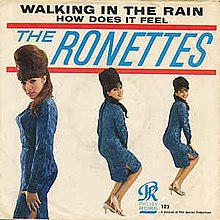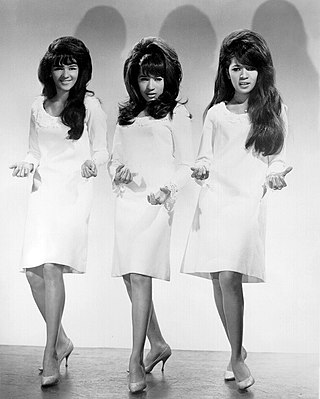
The Ronettes were an American girl group from Washington Heights, Manhattan, New York City. The group consisted of the lead singer Veronica Bennett, her older sister Estelle Bennett, and their cousin Nedra Talley. They had sung together since they were teenagers, then known as "The Darling Sisters". Signed first by Colpix Records in 1961, they moved to Phil Spector's Philles Records in March 1963 and changed their name to "The Ronettes".

"Me and Bobby McGee" is a song written by American singer-songwriter Kris Kristofferson and originally performed by Roger Miller. Fred Foster shares the writing credit, as Kristofferson wrote the song based on a suggestion from Foster. A posthumously released version by Janis Joplin topped the Billboard Hot 100 in 1971, making the song the second posthumously released No. 1 single in U.S. chart history after "(Sittin' On) The Dock of the Bay" by Otis Redding. Gordon Lightfoot released a version that reached number 1 on the Canadian country charts in 1970. Jerry Lee Lewis released a version that was number 1 on the country charts in December 1971/January 1972 as the "B" side of "Would You Take Another Chance on Me". Billboard ranked Joplin's version as the No. 11 song for 1971.
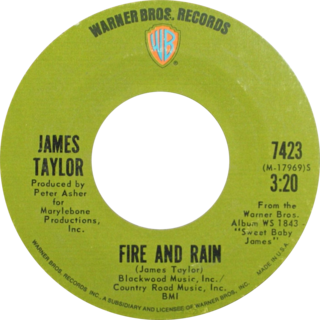
"Fire and Rain" is a song written and performed by American singer-songwriter James Taylor, released in August 1970 by Warner Bros. Records as the second single from Taylor's second studio album, Sweet Baby James. The song follows Taylor's reaction to the suicide of Suzanne Schnerr, a childhood friend, and his experiences with drug addiction and fame. After its release, "Fire and Rain" peaked at number two on RPM's Canada Top Singles chart and at number three on the Billboard Hot 100.
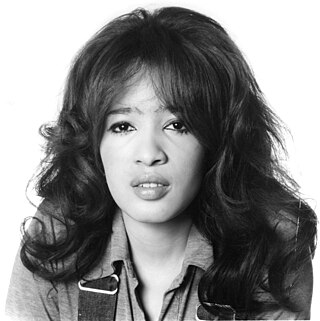
Veronica Yvette Greenfield was an American singer who co-founded and fronted the girl group the Ronettes. She is sometimes referred to as the original "bad girl of rock and roll".

"Promised Land" is a song lyric written by Chuck Berry to the melody of "Wabash Cannonball", an American folk song. The song was first recorded in this version by Berry in 1964 for his album St. Louis to Liverpool. Released in December 1964, it was Berry's fourth single issued following his prison term for a Mann Act conviction. The record peaked at #41 in the Billboard charts on January 16, 1965.

"Baby I Need Your Loving" is a 1964 hit single recorded by the Four Tops for the Motown label. Written and produced by Motown's main production team Holland–Dozier–Holland, the song was the group's first Motown single and their first pop Top 20 hit, making it to number 11 on the US Billboard Hot 100 and number four in Canada in the fall of 1964. It was also their first million-selling hit single.
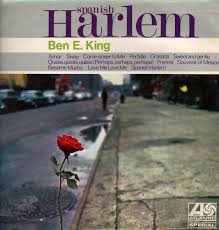
"Spanish Harlem" is a song recorded by Ben E. King in 1960 for Atco Records. It was written by Jerry Leiber and Phil Spector and produced by Jerry Leiber and Mike Stoller. "Spanish Harlem" was King's first hit away from The Drifters, peaking at number 15 on Billboard's rhythm and blues and number 10 in pop music chart.

"River Deep – Mountain High" is a song by Ike & Tina Turner released on Philles Records as the title track to their 1966 studio album. Produced by Phil Spector and written by Spector, Jeff Barry and Ellie Greenwich. Rolling Stone ranked "River Deep – Mountain High" No. 33 on their list of the 500 Greatest Songs of All Time. NME ranked it No. 37 on their list of the 500 Greatest Songs of All Time. The Rock and Roll Hall of Fame added it to the list of the 500 Songs That Shaped Rock and Roll. The song was inducted into the Grammy Hall of Fame in 1999.

"The Tracks of My Tears" is a song written by Smokey Robinson, Pete Moore, and Marv Tarplin. It is a multiple award-winning 1965 hit R&B song originally recorded by their group, the Miracles, on Motown's Tamla label. The Miracles' million-selling original version has been inducted into The Grammy Hall of Fame, has been ranked by the Recording Industry Association of America and The National Endowment for the Arts at No. 127 in its list of the "Songs of the Century" – the 365 Greatest Songs of the 20th Century, and has been selected by Rolling Stone as No. 50 on its list of "The 500 Greatest Songs of All Time", among many other awards. In 2021, Rolling Stone ranked the Miracles' original recording of "The Tracks of My Tears" as "The Greatest Motown Song of All Time".
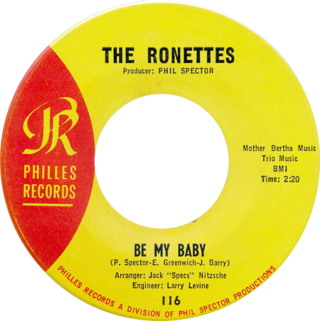
"Be My Baby" is a song by the American girl group the Ronettes that was released as a single on Philles Records in August 1963. Written by Jeff Barry, Ellie Greenwich, and Phil Spector, the song was the Ronettes' biggest hit, reaching number 2 in the U.S. and Canada, and number 4 in the UK. It was kept out of number 1 in Canada by Sugar Shack's 6 week run at number 1. It is often ranked as among the best songs of the 1960s, and has been regarded by various publications as one of the greatest songs of all time.
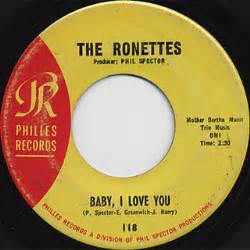
"Baby, I Love You" is a song originally recorded by the Ronettes in 1963 and released on their debut album Presenting the Fabulous Ronettes (1964). The song was written by Jeff Barry, Ellie Greenwich, and Phil Spector, and produced by Spector.
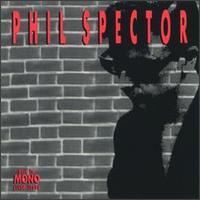
Back to Mono (1958–1969) is a box set that compiles tracks produced by American record producer Phil Spector between 1958 and 1969. It was released in 1991 by ABKCO. Initially a vinyl album-sized package, the box contained a booklet with photographs, complete song lyrics, discographical information, and a reproduction of the essay on Spector by Tom Wolfe, "The First Tycoon of Teen." The package also contained a small, round, red "Back to Mono" pin. In 2003, it was ranked number 64 on Rolling Stone's 500 Greatest Albums of All Time.

"I Can Hear Music" is a song written by Jeff Barry, Ellie Greenwich and Phil Spector for American girl group the Ronettes in 1966. This version spent one week on the Billboard Pop chart at number 100. In early 1969, the Beach Boys released a cover version as a single from their album 20/20 (1969), peaking at number 24 in the US.
"Chapel of Love" is a song written by Jeff Barry, Ellie Greenwich and Phil Spector, and made famous by The Dixie Cups in 1964, spending three weeks at number one on the Billboard Hot 100. The song tells of the happiness and excitement the narrator feels on her wedding day, for she and her love are going to the "chapel of love", and "[they'll] never be lonely anymore." Many other artists have recorded the song.

"Walk On By" is a song written by Burt Bacharach and Hal David for singer Dionne Warwick in 1963. Warwick's recording of the song peaked at number 6 on the US Billboard Hot 100 and number 1 on the Cash Box Rhythm and Blues Chart In June 1964 and was nominated for a 1965 Grammy Award for the Best Rhythm and Blues Recording.
"I Only Have Eyes for You" is a song by composer Harry Warren and lyricist Al Dubin. The song was written for the 1934 film Dames, in which it was performed by Dick Powell. Several other successful recordings of the song were made in 1934, and it later became a hit for the Flamingos in 1959 and Art Garfunkel in 1975.
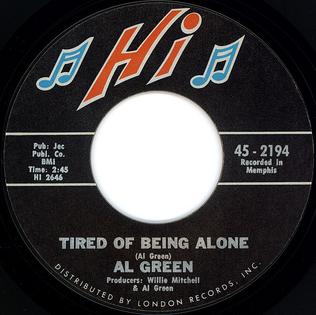
"Tired of Being Alone" is a soul song written by American singer Al Green. It reached number 11 on the Billboard Hot 100 and number seven on the Soul Singles Chart in 1971. Billboard ranked it as the number 12 song for 1971.

"Under the Boardwalk" is a pop song written by Kenny Young and Arthur Resnick and recorded by the Drifters in 1964. It charted at number four on the Billboard Hot 100 chart on August 22, 1964. The song has since been covered by many other artists, with versions by Bette Midler, Sam & Dave, Tom Tom Club, The Rolling Stones, Billy Joe Royal, The Beach Boys, Bruce Willis, Bad Boys Blue, John Mellencamp and Lynn Anderson all charting in the United States or overseas. The song ranked number 487 on Rolling Stone's list of The 500 Greatest Songs of All Time in 2004 and number 489 in 2010.

"Da Doo Ron Ron (When He Walked Me Home)" is a song written by Jeff Barry, Ellie Greenwich and Phil Spector. It first became a popular top five hit single for the American girl group the Crystals in 1963. American teen idol Shaun Cassidy recorded the song in 1977 and his version hit number one on the Billboard Hot 100 chart. There have also been many other cover versions of this song, including one by the songwriters Jeff Barry and Ellie Greenwich themselves, performing as the Raindrops.

"Then He Kissed Me" is a song written by Phil Spector, Ellie Greenwich and Jeff Barry. The song, produced by Spector, was initially released as a single on Philles Records (#115) in July 1963 by The Crystals. The lyrics are a narrative of a young woman's encounter, romance, and eventual engagement with a young man.
